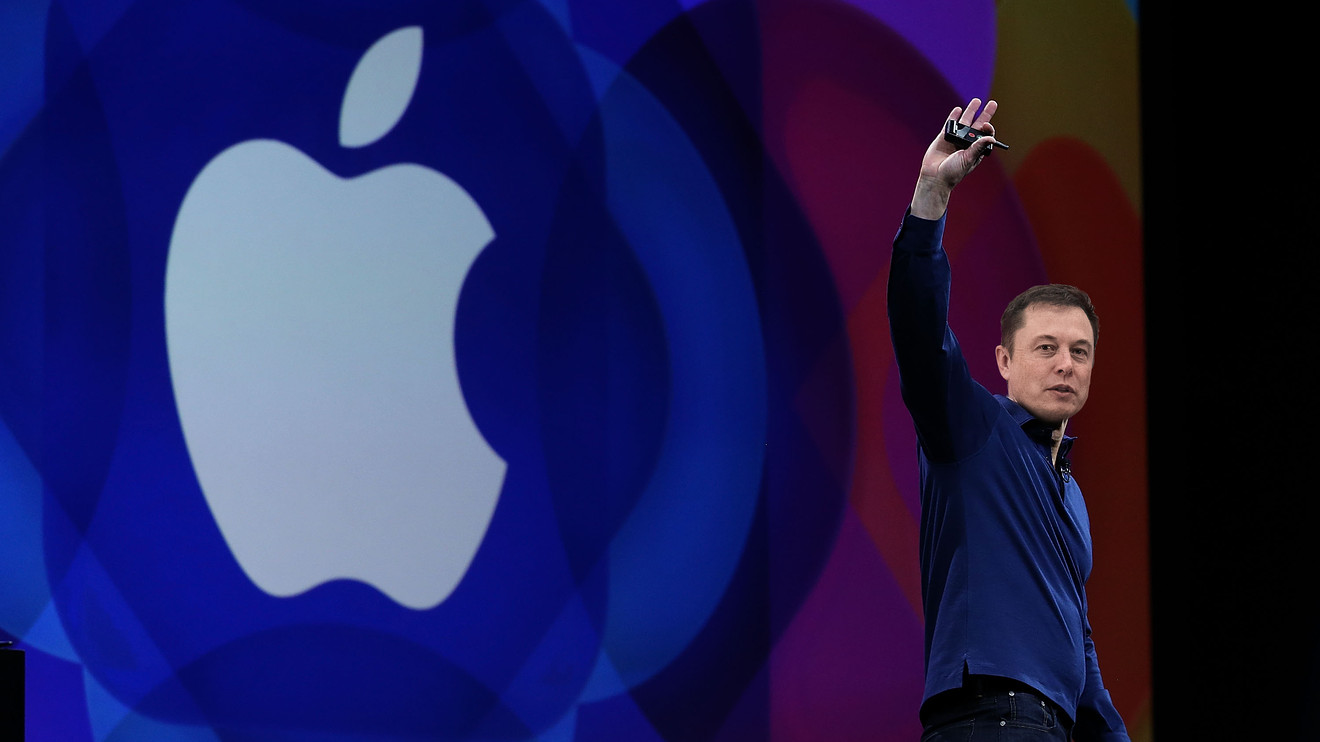By Chris White
Tesla CEO Elon Musk continues to dismiss the idea that Apple’s possible all-electric, self-driving vehicle, codenamed “Project Titan,” can compete with his empire, but there is evidence to suggest Musk should be concerned.
Musk told attendees at a technology conference Wednesday he expects the maker of the iPhone and iPad will have its first electric vehicle produced and ready to sell by 2020.
He even complimented Apple, telling the audience at the Code Convention the company will “probably make a good car,” and be successful. “They should have embarked on [the car] project sooner,” he added with a note of sarcasm.
Musk has ridiculed the company and its CEO Tim Cook in the past – he told the German business newspaper Handelsblatt in 2015, for instance, that the company Steve Jobs built is a “Tesla Graveyard” that employs rejected Tesla employees.
As Musk piles on the ridicule, it seems like a good time to point out five reasons why Tesla’s titular head should be quaking at the thought of Apple competing against him.
1. Unlike Tesla, Apple Actually Makes A Profit And Has A Lot Of Resources
Tesla’s cash reserves have tumbled this year below $1 billion, and are still falling, so it is likely the company might not survive long enough to deliver the much-touted, wallet-friendly Model 3 to people lining up to buy it.
In fact, the company was forced to sell $2 billion worth of stock just so it could raise the money to produce the Model 3, which has racked up nearly 400,000pre-orders and is priced at $35,000. The stock sell off also covers all the tax obligations for the options exercised by Musk. Company officials said in May the automaker aims to build a half-million vehicles within the next two years.
The California-based automaker used $1.4 billion in common stock to cover the expenses associated with the production of its coming Model 3.
Apple, on the other hand, is swimming in cash, posting a record profit of $18 billion during the past quarter. It has more than enough capital to fund an electric vehicle venture. The California-based company also has $178 billion in cash in total.
2. Tesla’s Business Model Could Be A “Ponzi Scheme” Incapable Of Keeping Up With Apple
Tech investment firm Devonshire Research Group firm sparked some controversy after it issued a report in May arguing Tesla’s financial model is very similar to an Enron-style “Ponzi scheme.”
“Tesla’s financing model is fragile; it is attempting to manage multiple financial instrument models under the same accounting umbrella — to our knowledge, one of the last companies to attempt this level of financial innovation was Enron,” the report states. One false move, the group added, could risk placing Musk’s venture into “a death spiral.
Meanwhile, Apple’s business model has produced products for customers for decades. It has designed and produced millions of useable products such as the iPhone, the iPad, and Apple Pay, which allow customers to make contact-less payments.
3. Tesla’s Brand Could Take A Hit For Not Being As Green As Advertised
Investment firm Devonshire Research Group argue in a March 21 report Tesla’s chassis, tires and entire structure create massive damage to the environment.
Tesla relies on lightweight structures to maintain its sustainable credibility, something Musk uses to market the company’s vehicles. One of the only ways for the company to bolster it claim of being a green champion, therefore, is through the use of a massive lithium-ion battery.
Lithium batteries cause more pollution during their production stage than gas-powered automobiles, according to the Union of Concerned Scientists, a science advocacy group in favor of environmental causes. Carbon-burning vehicles cause around twice as many emissions during their lifetime.
4. Unlike Tesla, Apple Probably Won’t Need Subsidies To Produce An Electric Vehicle
To keep the Model 3 below the $35,000 mark, Tesla customers will have to qualify for a $7,500 federal tax credit; the credit begins to expire after the company builds and sells 200,000 vehicles. Musk’s massive electric vehicle company will run out of tax credits by 2018, shortly before the Model 3 is slated to begin delivery and two years before Apple begins selling the electric vehicles.
Apple receives subsidies as well when selling its iPhones – customers, for example, must pay the full cost of a phone out-of-pocket to remain with their carrier, or they can jump to a new carrier and get the subsidized phone price while paying a termination fee upward of $350. Unlike Tesla, Apple’s subsidies come from phone companies such as Verizon Wireless and AT&T, not the government.
5. History Favors Apple
History shows Apple will become a massive headache for Tesla to overcome if it intend on producing and selling electric vehicles. Over the past 15 years, Apple products have pushed competitors out of the digital market.
The company’s iPod music players and iTunes, for instance, forced the entire music industry to shift to digital. The iPhone essentially created the smartphone market, and in the process created wearable computers.





3 comments
… [Trackback]
[…] There you can find 12089 more Info to that Topic: thelibertarianrepublic.com/5-reasons-why-elon-musk-should-fear-apples-electric-vehicles/ […]
… [Trackback]
[…] Read More on that Topic: thelibertarianrepublic.com/5-reasons-why-elon-musk-should-fear-apples-electric-vehicles/ […]
… [Trackback]
[…] Information to that Topic: thelibertarianrepublic.com/5-reasons-why-elon-musk-should-fear-apples-electric-vehicles/ […]